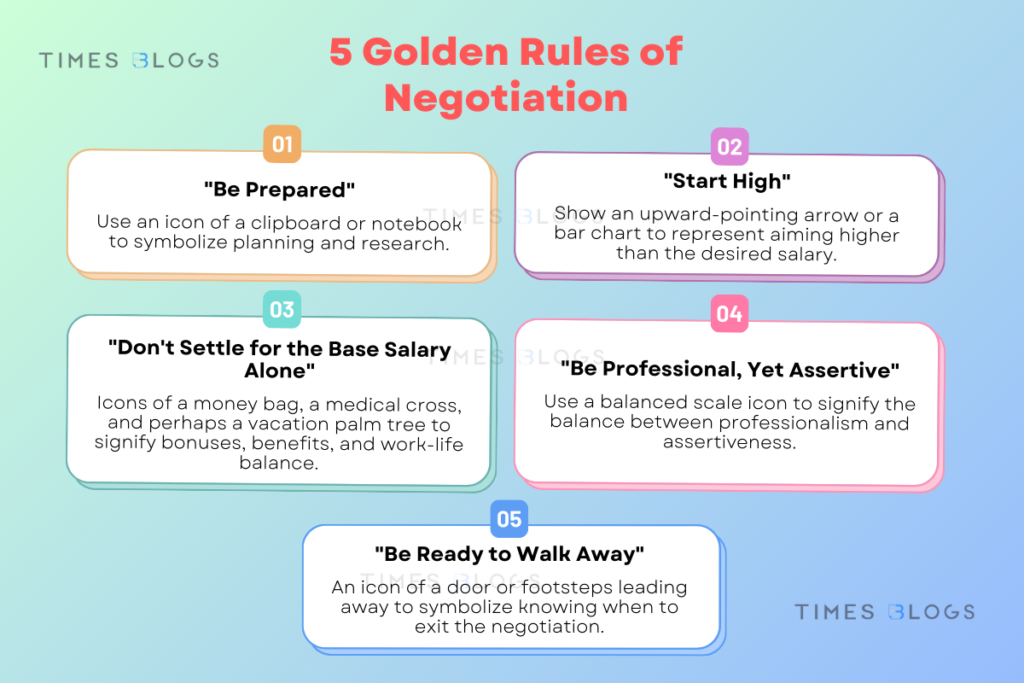Introduction
Before we embark on this comprehensive journey to master the skill of salary negotiation, let’s acknowledge a universal truth: Money may not buy happiness, but it does play a critical role in our professional and personal lives. That’s why the question of how to negotiate salary resonates with nearly every job seeker, regardless of industry or experience level.
Your Worth is More Than Just a Number
Embarking on the quest for a new job can feel like an exhilarating journey, filled with opportunities, possibilities, and—let’s be honest—a bit of stress. One of the most daunting hills to climb? The art of salary negotiation. Whether you’re stepping into the professional world with a freshly minted diploma in hand or you’ve been around the corporate block a few times, the question of how to negotiate salary is one that often makes palms sweat and hearts race.
The Reality of Today’s Job Market
In the ever-evolving landscape of today’s job market, negotiation skills have moved from being a “nice-to-have” to a “must-have.” Companies are more flexible than ever, acknowledging that a one-size-fits-all approach to salary simply doesn’t cut it. Consequently, your ability to negotiate your salary effectively could be the key differentiator that lands you not just a job but a job that pays what you’re worth.
Unpacking The Guide
So, how do you navigate the complex territory of salary negotiations without selling yourself short or, conversely, pricing yourself out of your dream job? This comprehensive guide is here to equip you with the essential tools and strategies you need to negotiate your salary like a pro. You’ll learn:
- Why salary negotiation is crucial for long-term career growth
- When is the perfect moment to bring up the topic
- How to accurately gauge your market worth
- The art of leveraging your unique skills and experience
- Mastering the golden rules of negotiation
- What pitfalls to avoid that could sabotage your negotiation
Getting The Pay You Deserve
By the end of this guide, you’ll walk into any negotiation room with the confidence of a seasoned negotiator. We’ll demystify the process, break down the barriers, and most importantly, help you articulate your worth in terms that employers will both understand and respect. Because let’s face it, you’re not just negotiating for today; you’re setting the financial trajectory for your future.
So, are you ready to conquer the world of salary negotiation? Let’s dive in and arm you with everything you need to know on how to negotiate salary effectively.
Table of Contents
The Importance of Negotiating Salary
Before we dive into the nuances of how to negotiate salary, let’s first establish why this skill is so crucial in your professional journey. Surprisingly, many people overlook the art of negotiation, considering it an uncomfortable or optional part of the job search process, but its impact is far-reaching and long-lasting.
Beyond the Monthly Paycheck: An Extension of Your Value
When you’re offered a job, the salary number that appears on your contract isn’t just digits and decimals; it’s a tangible valuation of your skills, experience, and what you bring to the table. Think of it as the company’s quantifiable way of saying, “This is what we believe you’re worth.” Understanding how to negotiate salary effectively allows you to align this figure with your own valuation, ensuring that you’re fairly compensated for your contributions.
The Ripple Effect: Long-Term Financial Impact
Sure, negotiating your salary impacts your immediate monthly income, but its repercussions extend far beyond your current job role. Every salary negotiation sets a precedent for your future earnings. Why? Because salary hikes, bonuses, and other financial benefits are often calculated as a percentage of your base pay. This means that a well-negotiated salary today could translate into a larger annual bonus, a heftier raise, and even more considerable contributions to your retirement fund in the long run.
The Emotional and Psychological Benefits
Let’s not underestimate the emotional and psychological benefits of a well-negotiated salary. Feeling adequately compensated for your work can boost your job satisfaction, reduce stress, and improve your overall well-being. In contrast, feeling undervalued can lead to demotivation, reduced productivity, and even workplace resentment. Salary negotiation isn’t just about the numbers; it’s also about fostering a healthier, more positive work environment for yourself.
A Skill for All Seasons
Understanding how to negotiate salary is a life skill that never goes out of style. Whether you’re fresh out of college, shifting careers, or aiming for that upper-management position, salary negotiation is universally relevant. Not only will you use it throughout your professional journey, but you’ll also find that the skill itself becomes refined with each negotiation, giving you a broader perspective and sharper tactics for the future.
A Snowball Effect on Your Financial Health
Once you understand how to negotiate salary effectively, you’ll see a compounding positive impact on your overall financial picture. Think about the benefits of an extra $5,000 per year. Over a 10-year span, that’s an additional $50,000, not accounting for potential interest or investments you could make with that extra money. The cumulative effect could significantly alter your financial landscape, affecting everything from your ability to purchase a home to how comfortably you can retire.

When to Discuss Salary
Before diving into the tactics and strategies, timing is the first crucial element you need to nail down in the art of how to negotiate salary. While you may be eager to discuss your financial prospects, doing so too soon—or too late—can affect the trajectory of the entire negotiation process.
The Perils of Jumping the Gun
Discussing salary too early in the interview process can send the wrong message. While you might be genuinely interested in the position, raising the money question prematurely can make you appear more focused on the financial gains rather than contributing to the company’s success. As a result, this could undermine your chances of getting the job offer and your ability to negotiate salary effectively later on.
Striking the Balance: When is the Right Time?
The ideal time for salary discussion usually falls after you’ve received a job offer. At this juncture, the employer has already expressed a commitment to you and your skills, making them more likely to be open to negotiation. You’ve transitioned from being one candidate in a pool to being their chosen candidate—this shift gives you some leverage in how to negotiate salary.
Let Them Make the First Move
For the uninitiated, the world of salary negotiation can be intimidating. If you’re unsure about when to broach the subject, a good rule of thumb is to let the employer make the first move by stating their offered salary range or package. This gives you a foundational number to work from, allowing you to build a well-informed counter-offer.
The Danger of Waiting Too Long
While patience is a virtue in salary negotiation, waiting too long can have its pitfalls too. The further you go into the onboarding process without discussing salary, the less leverage you may have. At this point, you’ve invested time and effort, and the employer may interpret your silence as satisfaction with the initial offer, making it difficult to negotiate salary later on.
How to Research Your Worth Before Negotiating Salary
A fundamental aspect of knowing how to negotiate salary effectively is understanding your worth in the job market. This isn’t just a feel-good mantra; it’s a strategic imperative. You can’t expect to negotiate a salary that truly reflects your skills and experience if you’re not armed with the right data. So, how do you go about researching your worth?

Industry Standards: Know the Norms
The first step in your journey to understanding how to negotiate salary is to know the industry standards. You need a benchmark against which to compare any offers that come your way. Websites like Glassdoor, Payscale, and LinkedIn Salary Insights can be excellent resources for this kind of information. These platforms provide salary data for various roles across different locations, giving you a comprehensive view of what you can expect to earn.
Company Size Matters: Adjust Your Expectations
Bigger companies usually offer better salaries and more benefits, often due to more substantial financial resources and the need to attract top talent. Keep this in mind as you contemplate how to negotiate salary. If you’re interviewing with a large corporation, you might have a bit more wiggle room for negotiation compared to a smaller firm with a tighter budget.
Assess Your Personal Value: Beyond the Resume
Your personal experience, unique skills, and qualifications should not be underestimated when figuring out how to negotiate salary. Take stock of your achievements, accolades, and even soft skills like leadership or problem-solving. These can be valuable bargaining chips when discussing salary with a potential employer. Make a list and be prepared to articulate why these factors make you worth more.
Economic Factors: The Bigger Picture
Last, but not least, consider the cost of living in your area and any economic trends that might affect salaries in your industry. For instance, if you’re in a booming tech city like San Francisco, salaries will naturally be higher to account for the higher living costs. On the flip side, if the economy is going through a downturn, companies may be less willing to negotiate salaries. Having this broader economic perspective can give you an edge in understanding how to negotiate salary effectively.
Understanding Your Leverage: The Secret Weapon in How to Negotiate Salary
In the arena of salary negotiation, leverage is your secret weapon. It’s the ace up your sleeve that empowers you to negotiate from a position of strength. Understanding your leverage is crucial in knowing how to negotiate salary effectively.
Special Skill Sets: Your Unique Selling Proposition
Do you have a specialized skill set that sets you apart from other candidates? Maybe you’re a software developer with experience in AI, or a marketing professional with a proven track record in growing e-commerce businesses. These unique skills are your leverage points. They don’t just make you more desirable as a candidate; they make you more powerful in the negotiation process. The rarer your skills, the more leverage you have when figuring out how to negotiate salary.
Education Level: A Special Focus
Your education level can indeed serve as a powerful point of leverage. It’s not just about having a degree; it’s about the quality of your education, the relevance to the job, and any specialized training you might have received. If you’ve completed high-level courses, have certifications, or have attended workshops that add value to the job role you’re targeting, these can serve as strong leverage points.
Years of Experience: Not Just a Number
Experience isn’t just a number of years; it’s a testament to your ability to handle job-related challenges and contribute to a company’s growth. If you have years of relevant experience, you have a strong negotiating position. Use this to your advantage when discussing how to negotiate salary with potential employers.
Company Urgency: Timing is Everything
Understanding the urgency behind the company’s hiring needs can also give you significant leverage. If the company needs to fill a role urgently—perhaps due to an upcoming project or a sudden vacancy—that urgency is leverage you can use in negotiating salary. Your capacity to step in and make an immediate impact can be a persuasive argument when determining how to negotiate salary effectively.
Demand for Your Role: Know the Market
Last but not least, be aware of the market demand for your role. Some positions are more in-demand than others. If you’re in a field with a shortage of qualified professionals, this scarcity can significantly boost your leverage. Be sure to factor this into your strategy on how to negotiate salary.
Understanding your leverage can significantly influence the outcomes of your salary negotiation. It can be the difference between a mediocre offer and a deal that truly reflects your value. Armed with this knowledge, you’re now better prepared in the art of how to negotiate salary.

The 5 Golden Rules of How to Negotiate Salary: A Blueprint for Success
Negotiating salary can often feel like navigating a minefield, but following these 5 Golden Rules can guide you through it with confidence. Here’s a deeper look into each rule and how they apply to the art of how to negotiate salary:
1. Be Prepared: Your Research is Your Ally
Knowledge is power, especially when it comes to how to negotiate salary. Walk into the meeting armed with all the data you need. This includes industry salary standards, the average pay at the company, and information on benefits and bonuses. The more prepared you are, the stronger your position will be during the negotiation.
2. Start High: Give Yourself Negotiation Room
A fundamental rule of how to negotiate salary is to aim higher than your actual desired amount. This strategy not only gives you some negotiating room but also sets the expectation that you value your skills and experience highly. Be realistic, though; starting too high could also turn off potential employers.
3. Don’t Settle for the Base Salary Alone: Look at the Entire Package
When thinking about how to negotiate salary, don’t focus solely on the base pay. Remember to discuss other compensation elements like bonuses, benefits, and work-life balance perks like remote working options or flexible hours. These elements can add substantial value to your overall package and should be part of your strategy in how to negotiate salary effectively.
4. Be Professional, Yet Assertive: Striking the Balance
As you navigate how to negotiate salary, maintaining a professional yet assertive demeanor is crucial. Show enthusiasm for the role and the company, but also make it clear what you expect in terms of compensation. Your ability to balance these two can significantly influence how successful you are in negotiating your salary.
5. Be Ready to Walk Away: Knowing Your Worth
Sometimes the hardest part of how to negotiate salary is knowing when to walk away. If the offer isn’t meeting your expectations and there’s no room for further negotiation, it’s okay to wait for a better opportunity. Knowing your worth and being prepared to act on it is the ultimate assertion of your value in any salary negotiation.
By adhering to these 5 Golden Rules on how to negotiate salary, you’ll be well-equipped to secure a compensation package that genuinely reflects your skills and contributions. Remember, the goal isn’t just to get a job; it’s to get a job that pays you what you’re worth.
Common Salary Negotiation Mistakes to Avoid: How to Negotiate Salary the Right Way
Knowing how to negotiate salary is crucial, but it’s also vital to be aware of common pitfalls that could hinder your efforts. Avoiding these mistakes can significantly improve your chances of successfully negotiating the salary you deserve.
Accepting the First Offer: Know When to Counter
One of the biggest mistakes in how to negotiate salary is accepting the first offer without countering. While the initial offer can be enticing, remember that it’s often just a starting point. Don’t sell yourself short by not negotiating; rarely is the first offer the best one you can get.
Being Too Aggressive or Too Passive: Striking the Right Balance
Another mistake in the art of how to negotiate salary is leaning too much toward either aggression or passivity. Being too aggressive can turn off your potential employer, while being too passive could leave money on the table. The key is to find a middle ground where you assert your worth without being confrontational.
Focusing Solely on Salary: Think Holistically
Many people think that knowing how to negotiate salary is all about the base pay. However, neglecting to consider other aspects of the compensation package is a common mistake. Don’t forget about health insurance, retirement contributions, bonuses, and even work-life balance perks like remote work options. All these factors should be part of your salary negotiation strategy.
Lack of Research: Knowledge is Power
Going into a negotiation without adequate information is a major blunder. Doing your homework is crucial in learning how to negotiate salary effectively. Make sure you know the industry standards, the company’s usual compensation package, and your own worth before you sit down at the negotiation table.
Not Practicing: Preparation is Key
Negotiating salary is a skill, and like any skill, it gets better with practice. One of the most overlooked aspects of how to negotiate salary is role-playing the negotiation process with a friend or family member. This exercise can reveal your strengths and weaknesses, helping you refine your strategy and tactics.
By understanding these common mistakes in how to negotiate salary, you can better navigate the negotiation process and secure a compensation package that accurately reflects your value. Preparation and awareness are your best allies in any negotiation, so take these insights to heart and put your best foot forward.
The Follow-Up: An Often-Overlooked Step in How to Negotiate Salary
Negotiating a salary doesn’t end when you leave the table. The follow-up is crucial. Here’s what to focus on:
Confirm in Writing
After agreeing on terms, ensure you get everything in writing. This not only acts as a legal safeguard but also clears any ambiguity. It’s a step you can’t afford to skip if you want to know how to negotiate salary effectively. A written document formalizes your agreement, making future conversations about responsibilities or pay much more straightforward.
Continue to Showcase Value
Accepting the offer is merely the starting line. To justify your negotiated salary and pave the way for future raises, continue to excel in your role. Keep track of your achievements and don’t hesitate to share them during performance reviews. This ongoing effort reaffirms your value to the company and is a critical extension of how to negotiate salary.
Keep the Door Open
If you have to walk away from an offer, do so respectfully. Thank your potential employer for their time and express your hope to find an opportunity to work together in the future. The world is small, and industries are even smaller; you never know when you’ll run into the same people again. A graceful exit is not just good etiquette; it’s also a savvy career move and a nuanced part of how to negotiate salary.
Special Circumstances: Advanced Strategies on How to Negotiate Salary
Sometimes you’ll face unique scenarios that require a tailored approach. Here are some special circumstances and how to navigate them:
When You’re Changing Industries
Switching fields? Don’t underestimate the value of your previous experience. Identify skills from your previous role that can enhance your performance in the new job. By effectively communicating this transferable skill set, you bolster your negotiation power, offering a fresh perspective on how to negotiate salary in unfamiliar terrain.
If You’re Returning to the Workforce
If you’ve taken a hiatus for family or educational reasons, don’t underestimate your worth. Highlight skills and insights gained during your time away as valuable additions to your professional toolkit. These unique experiences can help you make a compelling case for a competitive salary, altering the typical dynamics of how to negotiate salary.
Geographic Relocations
Moving for a job entails various expenses and changes in your cost of living. When negotiating your salary, factor in not just the numbers but what those numbers will mean in your new city. This comprehensive approach will help you secure a salary that truly reflects your needs and continues the narrative on how to negotiate salary effectively.
Multiple Job Offers
Having more than one job offer is a strong bargaining chip. Use this to negotiate better terms but tread carefully to avoid seeming arrogant. Being transparent about other opportunities can motivate a potential employer to present their best offer, giving you another layer of strategy in how to negotiate salary.
Wrap-Up
Learning how to negotiate salary isn’t just about increasing the digits on your paycheck; it’s a vital life skill that empowers you to acknowledge your worth and make informed decisions that can positively impact your career for years to come.
So don’t hesitate. Arm yourself with this comprehensive guide on how to negotiate salary, and step into that negotiation room with both confidence and strategy. You’re not just another applicant; you’re a valuable asset, and it’s time that your compensation reflects that.
By understanding your worth, knowing your leverage, and adhering to the golden rules of how to negotiate salary, you’re well-equipped to navigate the intricacies of salary negotiation. So go ahead, make your case, and secure the financial future you not only desire but truly deserve.
And there you have it—a comprehensive guide on how to negotiate salary that leaves no stone unturned. From the initial research to the final handshake, you now have the tools you need to ensure you’re fairly compensated for your skills, experience, and overall value to any company.
Feel free to reach out if you have more questions or would like further details. Good luck, and happy negotiating!




